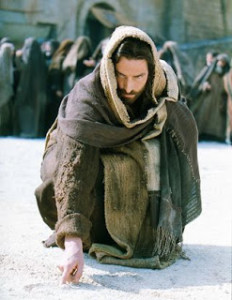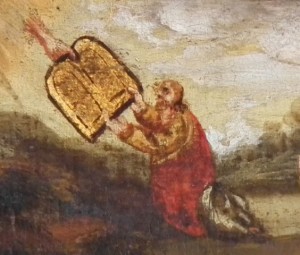The “finger of God” in Exodus
The first time the “finger of God” appears is during the plagues of Egypt, specifically during the plague of gnats. Pharaoh’s magicians are frustrated in their attempts to produce gnats by their magical arts and tell Pharaoh: “This is the finger of God” (Exod 8:19). Of course, he does not believe them and continues in his famous obstinance. But the point is, in this instance it seems that “finger” means power. I’ll quote the UBS Handbook on Exodus on this point:
This is the finger of God is a literal translation. The expression finger of God, however, is usually understood to mean the power of God in the same way that “hand of God” is often used (for example, 3:20; 7:4; 9:5). This type of figure of speech is known as “synecdoche,” meaning that a part represents the whole, a finger or hand here representing the full power or the full person. And so this may be translated dynamically as “This is the power of God,” “This is an act of God,” “God has done this” (8:19 TEV), or “God has shown his power by doing this” (N. D. Osborn & H. A. Hatton, A Handbook on Exodus, [New York: United Bible Societies, 1999] p. 188).
Ok, while the UBS Handbook goes on to discuss other possibilities, for example, that the magicians identified Aaron’s staff as the “finger of God,” here the idea of finger=power seems to work just fine. So far, there is no distinctions between “finger” and “hand” as far as denoting abstract ideas.
Yet if we jump ahead just a bit to Exodus 31:18, then we see that the stone tablets of the Ten Commandments are “written with the finger of God.” Here, rather than indicating raw power, the “finger” is connected with the activity of writing. The same idea reappears in a parallel discussion of the tablets in Deut 9:10.
Later in the Old Testament
While the largest share of the “finger” references in the Old Testament have to do with blood manipulations rituals in Leviticus, God’s “fingers” reappear in Psalm 8:3
When I look at your heavens, the work of your fingers,
the moon and the stars, which you have set in place
Here, one could equate “finger” with power, but I think it would be better to go with the poet and see God as setting the various heavenly bodies in the canopy of heaven, almost like one decorating for a party. The psalmist is not describing God’s capability to create, but his artistry, his dexterity, if you will.
(While not divine fingers themselves, Isaiah criticizes those who bow down to idols made with their own fingers [Isa 2:8, 17:8].)
The next, and I think most telling, example comes from Daniel, where the “fingers of a human hand” (Dan 5:5) appear and write a terrifying inscription on the wall of the pala ce during King Belshazzar’s sacrilegious romp, where he and his frat buddies are drinking wine from the sacred vessels of the Temple. This divine hand writes out a death sentence for Belshazzar: MENE, MENE, TEKEL, PARSIN (v. 25). Here, clearly, the fingers of God are connected with the concept of writing, as they were in Exodus 31 and the stone tablets.
ce during King Belshazzar’s sacrilegious romp, where he and his frat buddies are drinking wine from the sacred vessels of the Temple. This divine hand writes out a death sentence for Belshazzar: MENE, MENE, TEKEL, PARSIN (v. 25). Here, clearly, the fingers of God are connected with the concept of writing, as they were in Exodus 31 and the stone tablets.
New Testament Fingers of God
Jesus uses his fingers to cure a deaf man (Mark 7:33), which seems to indicate they have to do with power. In addition, he refers to how “it is by the finger of God that I cast out demons,” (Luke 11:20). Here, we could easily equate finger and power: “it is by the power of God…” Yet, I think there might be one slightly hidden example in John 8:6, where Jesus writes “with his finger on the ground.” It is during the scene where an anger mob is trying to stone a woman caught in adultery and get Jesus to sanction their action. He instead writes on the ground. If the writing is anything like stone tablets or even worse, the cryptic phrase on Belshazzar’s wall, Jesus could be writing the condemnation of the woman’s accusers in the dirt.
In sum, when the “finger” of God appears in the Bible, as opposed to his “hand” or “arm,” it seems to indicate the writing of God and therefore his intentions—whether in law, creation or judgment. Jesus exemplifies this meaning when he writes with his finger in the dirt, perhaps listing off the sins of his opponents.

